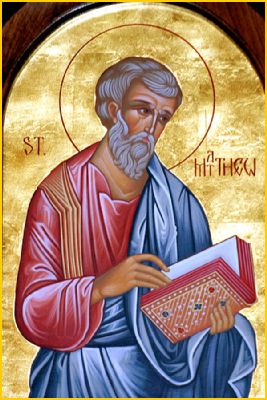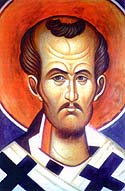|
|||
|---|---|---|---|
| This weekly bulletin insert complements the curriculum published by the Department of Christian Education of the Orthodox Church in America. This and many other Christian Education resources are available at http://dce.oca.org. | |||

The Church remembers many saints who are intimately connected with the Holy Bible. Two of them are the Gospel writer Matthew, and Saint John Chrysostom. Matthew's Gospel enlightens readers about Jesus Christ as the promised Savior and fulfiller of the Old Testament prophecies. Writing to his fellow Jews, Matthew presents Christ's life as the completion of God's plan for humanity, worked out over the centuries of Israel's history. Saint John Chrysostom loved the Bible, and passionately exhorted Christians to read it. He wrote, "If we are willing to examine the Scriptures in this way, carefully and systematically, we shall be able to obtain our salvation." Chrysostom was particularly concerned about children: "Never deem it an unnecessary thing that [a child] should be a diligent hearer of the divine Scriptures...Do not imagine that the monk alone stands in need of these lessons from Scripture. Of all others, the children just about to enter the world especially need them." We might imagine that the brilliant Thomas Jefferson also honored the Scriptures and agreed with Chrysostom that they undergird our salvation. But a small book called "The Jefferson Bible" proves that we would be wrong. To create his book, Thomas Jefferson cut, rearranged and pasted the Gospels, leaving out the miracles and other parts he deemed useless. Jefferson admired many sayings of Jesus as displays of "fine imagination, correct morality and the most lovely benevolence." But other sayings were full of "so much ignorance, so much absurdity, so much untruth, charlatanism and imposture, as to pronounce it impossible that such contradictions should have proceeded from the same Being." Jefferson blamed the "feeble minds" of the disciples for the problem. They had piled superstitions, fabrications and "things impossible" on top of Jesus' pure moral and ethical teachings. So he removed their additions, leaving the exquisite moral precepts intact. The resulting book has strange gaps left by Jefferson's editing. One example is Jesus' encounter with the man born blind. The disciples ask Him who sinned, the man or his parents. Jesus answers, "Neither hath this man sinned, nor his parents; but that the works of God should be made manifest in him." 
But the very next verse is, "Verily, verily, I say unto you, He that entereth not by the door of the sheepfold, but climbeth up some other way, the same is a thief and a robber." The blind man's healing, the exact thing to which Jesus is referring when He says that the works of God should be made manifest in him, is gone. The sheepfold verses don't even logically follow, and the healing miracle which exemplifies Jesus' divine compassion is consigned to the wastebasket. There are people today who also cut and paste the Bible, and accuse the followers of Jesus Christ of adding to His original teachings. But we are called to take the Bible as the Church has given it to us. Otherwise we are, in Chrysostom's words, merely performing "labors without advantage." |
|||
